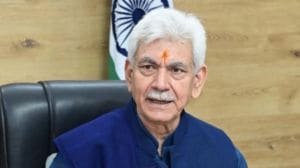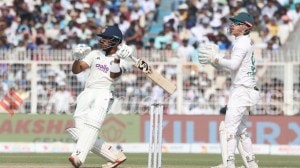Hold your fire on LoC, in Valley: General to India
Unleashing his familiar charm offensive on visiting Indian MPs over tea and apple juice in the glittering reception hall of Pakistan’s ...

Unleashing his familiar charm offensive on visiting Indian MPs over tea and apple juice in the glittering reception hall of Pakistan’s Aiwan-e-Sadr, President Prevez Musharraf today said India must agree to cease fire on the Line of Control and in the Valley.
‘‘We must offensively pursue peace,’’ said Musharraf, looking relaxed yet somehow agitated, eager to please but occasionally cantankerous after the usual words of welcome.
He spoke of Indo-Pak hostility and his personal suffering, how he had named his son after his closest friend killed in the 1971 war and how many of his men died in his arms during skirmishes.
Responding to a question from The Indian Express, he said though he believed people-to-people contacts should continue, Track II diplomacy never really worked.
‘‘My question is why aren’t formal talks beginning? Why aren’t foreign secretary level talks taking place? Let’s start solving problems through formal peace talks. There is no formal peace process. There is no formal dialogue process. Why is India delaying? What do they hope to achieve by delaying? What do they hope to achieve by delaying? At the moment, there is no contact, why only these backdoor channels?’’
He says he was ‘‘ready to begin talks yesterday’’ but ‘‘India must agree to a ceasefire on the Line of Control and in the Valley, reduce atrocities and military activity in the Valley, accept Kashmir as a disputed area, release political prisoners in Kashmir and stop its vicious propaganda.’’
He sketched out the points he raised at Agra and said he was willing to go beyond stated positions. ‘‘You keep saying I am rigid and I am not flexible but I am willing to go on television to say I am willing to go beyond stated positions.’’ Yet the General somewhat contradicted himself because he refused to budge from his stated position that Kashmir was the core issue.
He repeated the mantra of magnanimity being the duty of the bigger country and that India ought to be big-hearted. He flatly denied any cross-border terrorism, saying it was not as if you blow the whistle from here and activate the mujahideen. He claimed there were ‘‘freelance elements operating’’ who could, however, be ‘‘facilitated to give up the gun.’’
He thrilled the Indian MPs with his regular use of ‘‘I will be frank with you… Let me confide in you… Let me be straight with you.’’
He said there was no point going back in history because ‘‘if you bring up Kargil, I will bring up Siachen.’’ He said he was ‘‘a little hurt’’ when he read an Indian magazine report which accused him of building a Chinese naval base when all he had done was construct a harbour for ‘‘economic reasons.’’
The MPs — there was a little skirmish over seating arrangements with Margaret Alva and Mani Shankar Aiyar voicing strong protests at being seated after (and not before) Laloo — got down to competitive questioning and long statements after the General had finished speaking.
Musharraf remained alert, even took notes of Laloo highlighting problems of Amritsar’s dry fruit traders, of Paswan repeating how he had resigned after Gujarat.
Aiyar was at pains to point out that he went to Cambridge with Pakistan Foreign Minister Mehmood Kasuri and Dinesh Trivedi of Trinamool said he ‘‘adored’’ the General’s frankness.
‘‘A smart cookie,’’ said Alva afterwards. ‘‘He has used us,’’ said Abani Roy of the CPI(M), ‘‘used us to project himself. We had to ask questions and he did all the answering, so he looked great and we looked like fools.’’
Rahman Khan of Congress confessed: ‘‘I am totally floored, we are taken aback by his frankness and straightforwadness. But does he mean what he says?’’





- 01
- 02
- 03
- 04
- 05


























